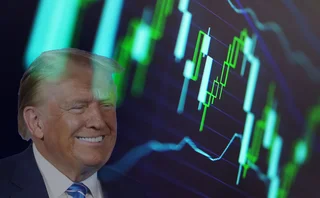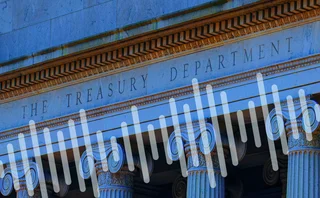
Trump’s Basel stance is key for Asian banks
Donald Trump may have strengthened ties with the region, but the true impact of his administration on Asia remains to be seen
Donald Trump’s first 100 days in the White House have been less damaging to Asia’s financial sector than feared – but it will be the next 100 days that matter the most.
Trump may have made good on his electoral promise to withdraw from the Trans-Pacific Partnership trade agreement, but he has also strengthened diplomatic and economic ties in the region, including inviting the leaders of the two most important economies in the region – China and Japan – to his Florida-based Mar-a-Lago Club. He also wisely reversed his electoral pledge to brand China a currency manipulator.
But the true impact of the Trump administration in the region is yet to be felt.
Part of this is caught up in the still-unanswered question about the future of the Dodd-Frank Act. For all his pre-election bluster, it remains uncertain as to the extent that Trump will – or can – roll back the legislation.
Some Dodd-Frank tinkering, such as the widely expected revamp of the Volcker rule, will have a fairly limited impact in Asia. Other changes, such as replacing rules on how failing financial institutions are wound up (Title II of the Dodd-Frank Act) with a beefed-up version of the bankruptcy code, could be more significant.
The Hong Kong Monetary Authority, for example, which is host regulator to 29 of the world’s 30 largest banks, must make sure its own rules on recovery and resolution align with the rest of the world.
Perhaps the more significant question is what impact the man in the White House is going to have on completion of the current Basel reform process
But perhaps the more significant question is what impact the man in the White House is going to have on completion of the current Basel reform process.
Before he was elected, there was widespread concern that Trump would disengage from international commitments, including the G20 initiative to strengthen global financial market legislation. This could only be a negative, with a splintering of regulatory cohesiveness creating mayhem for global banks, including many Asian players.
Japanese regulators are reportedly so anxious that the Basel process is completed that they have asked their banks not to raise any concerns over the new framework until after a deal has been struck, reasoning a second-rate deal is better than the process collapsing altogether.
Contentious points
The first 100 days of Trump’s presidency has seen little progress towards resolving the contentious points that still remain open, such as how high the standardised floor for internal models should be. For its part, the US has been able to show little leadership on this, as many of the top positions in the country’s financial regulators have remained unfilled.
Only now is the US Senate starting to confirm Trump’s appointments. Jay Clayton has been confirmed as head of the Securities and Exchange Commission and Keith Noreika as acting comptroller of the currency. The confirmation of Christopher Giancarlo as head of the Commodity Futures Trading Commission is still pending. Some key appointments at the Federal Reserve Board of Governors are also anticipated.
With the return of Washington’s financial mojo, Trump now needs to show he can provide some clarity of thought, leadership and certainty to global regulation. For Asia’s sake – and that of the rest of the world.
Only users who have a paid subscription or are part of a corporate subscription are able to print or copy content.
To access these options, along with all other subscription benefits, please contact info@risk.net or view our subscription options here: http://subscriptions.risk.net/subscribe
You are currently unable to print this content. Please contact info@risk.net to find out more.
You are currently unable to copy this content. Please contact info@risk.net to find out more.
Copyright Infopro Digital Limited. All rights reserved.
As outlined in our terms and conditions, https://www.infopro-digital.com/terms-and-conditions/subscriptions/ (point 2.4), printing is limited to a single copy.
If you would like to purchase additional rights please email info@risk.net
Copyright Infopro Digital Limited. All rights reserved.
You may share this content using our article tools. As outlined in our terms and conditions, https://www.infopro-digital.com/terms-and-conditions/subscriptions/ (clause 2.4), an Authorised User may only make one copy of the materials for their own personal use. You must also comply with the restrictions in clause 2.5.
If you would like to purchase additional rights please email info@risk.net
More on Our take
Sticky fears about sticky inflation
Risk.net survey finds investors are not yet ready to declare victory on inflation – with good reason
Why a Trumpian world could be good for trend
Trump’s U-turns have hit returns, but the forces that put him in office could revive the investment strategy
Roll over, SRTs: Regulators fret over capital relief trades
Banks will have to balance the appeal of capital relief against the risk of a market shutdown
Thrown under the Omnibus: will GAR survive EU’s green rollback?
Green finance metric in limbo after suspension sees 90% of top EU banks forgo reporting
Has the Collins Amendment reached its endgame?
Scott Bessent wants to end the dual capital stack. How that would work in practice remains unclear
Talking Heads 2025: Who will buy Trump’s big, beautiful bonds?
Treasury issuance and hedge fund risks vex macro heavyweights
The AI explainability barrier is lowering
Improved and accessible tools can quickly make sense of complex models
Do BIS volumes soar past the trend?
FX market ADV has surged to $9.6 trillion in the latest triennial survey, but are these figures representative?







